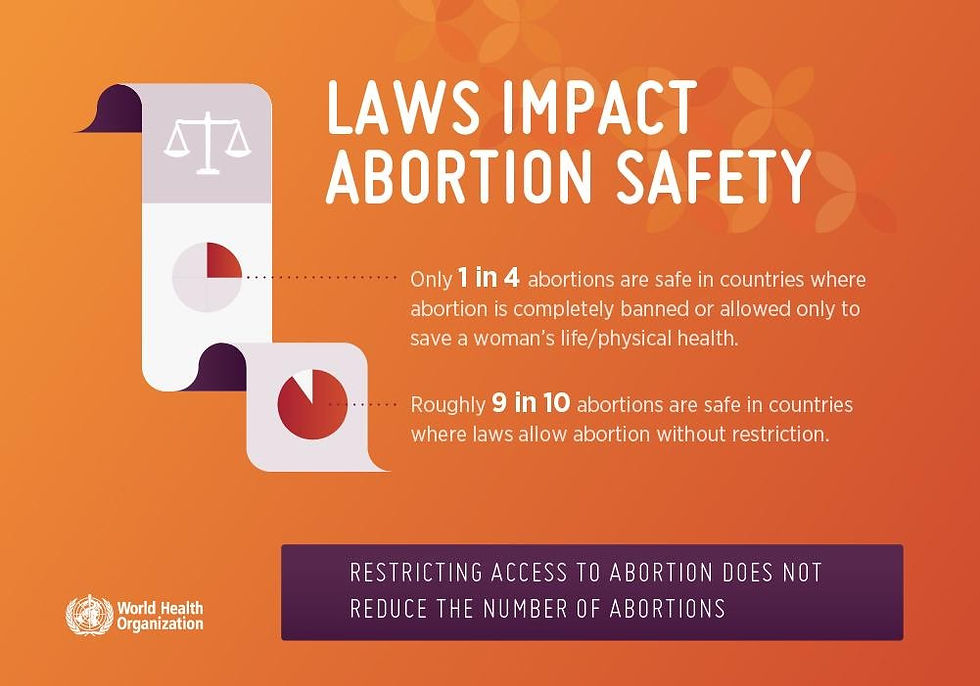Abortion: Legal But Not Always Practical
- Selin Örsçelik
- 30 May 2021
- 2 dakikada okunur
General Scope of Abortion

Abortion is a basic healthcare need for millions of women. Human rights law clearly spells out that decisions about your body are yours alone – this is what is known as bodily autonomy. In fact, access to abortion is one of the most hotly debated topics globally. This issue does not only involve doctors and scientists; it also causes conflicts among legal experts and politicians. Today there are many different legislative approaches regarding abortion, with some countries legalizing, some allowing under certain conditions, and some banning abortion altogether. Abortion is legal in 73 countries while it’s banned in 68 countries. According to WHO (World Health Organization), around 210 million pregnancy occur per year, and 46 million of them end up with abortion. One out of three pregnancies are either unwanted or unplanned. In Turkey, abortion is legally allowed until 10th week of pregnancy, and this timeframe can be extended if there is a medical condition endangering woman’s life or the life of the fetus. But in everyday practice, there are major problems that pregnant women face during this process.

Abortion In Turkey and Turkish Law

Abortion is regulated in both Turkish Penal Code and in the Family Planning Law. When Arts.99&100 of the Turkish Penal Code are examined following inferences can be made:
-In the Turkish Penal Code, the legal period for abortion is specified to be the first 10 weeks of pregnancy.
- This period can be extended to up to 20 weeks for crime victims who became pregnant as a result of the crime.
- The legislator stated that the abortion should be performed by specialist doctors in a hospital environment.
- The authorized person indicated by the law must perform the abortion within the legal period.
- When the rules of the conditions of authorization and pregnancy period indicated by law are not followed authorized/unauthorized person who performed the abortion AND the pregnant woman who gave consent to the abortion will both be punished.
The Family Planning Law also regulates abortion. Within the scope of this law, the following are legal requirements for abortion:
- In pregnancies up to the 10th week, the consent of the pregnant woman is required.
- If the pregnant woman is younger than 18 years, both her and the consent of her parents are required.
- If a minor has legal guardianship, the consent of legal guardian and the judge of Court of Peace are required. (A minor is defined as a person under the age 18.)
- If the pregnant woman is married, consent of the husband is required.

Conclusion
Legal status of abortion varies across the countries. In Turkish law, abortion is legal under certain conditions. However, in practice, access to abortion rights is very limited. Every country should provide safe, legal, and effective access to abortion. Laws and policies must promote the health, dignity and reproductive freedom of women and all pregnant people. Access to safe abortion is a matter of women’s rights. Access to safe abortion is a matter of human rights.

Author: Selin Örsçelik
REFERENCES
Ina K. Warriner,Iqbal H. Shah, Preventing Unsafe Abortion and its Consequences https://www.who.int/reproductivehealth/publications/unsafe_abortion/0939253763.pdf
Kadir Has Üniversitesi, Toplumsal Cinsiyet ve Kadın Çalışmaları Araştırma Merkezi, Yasal Ancak Ulaşılabilir Değil: Türkiye’deki Kamu Hastanelerinde Kürtaj Hizmetleri,2020 https://gender.khas.edu.tr/sites/gender.khas.edu.tr/files/docs/2020-12/2020-kurtaj-arastirmasi-raporu.pdf









Yorumlar